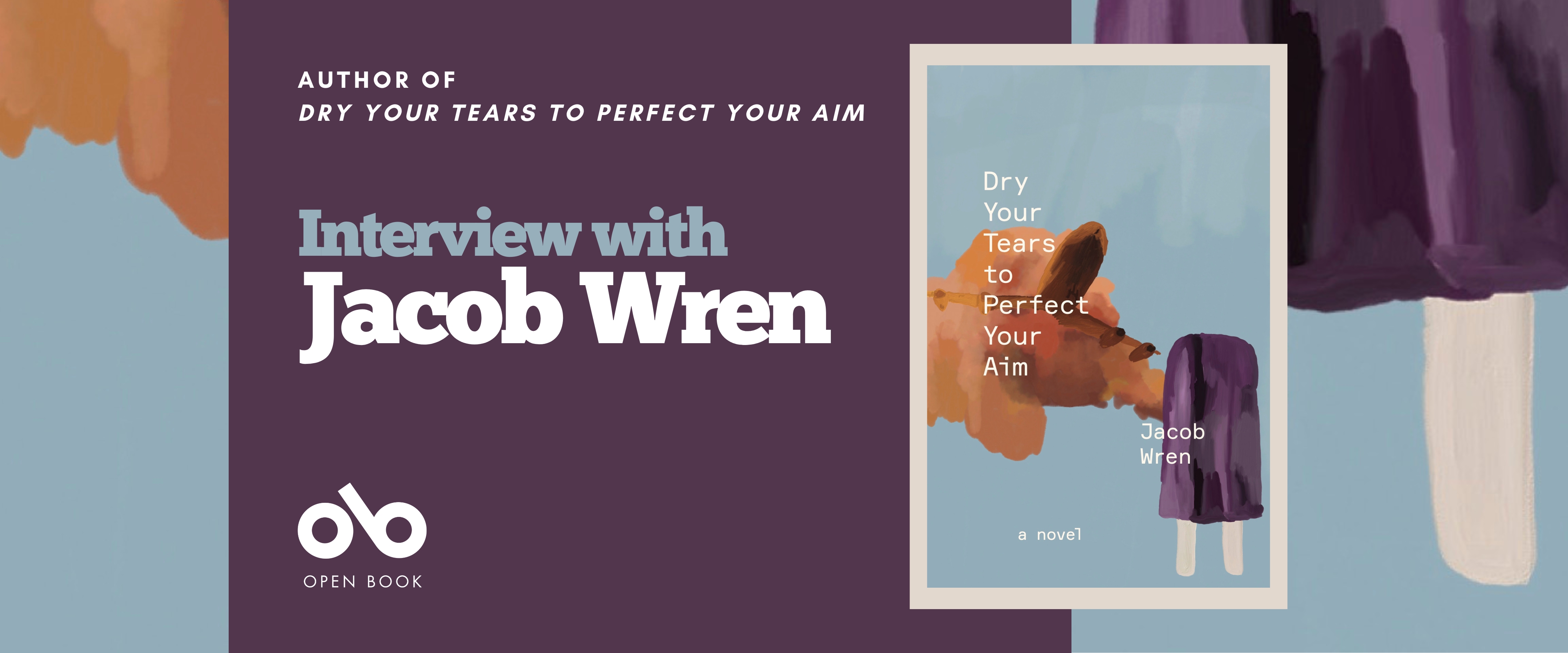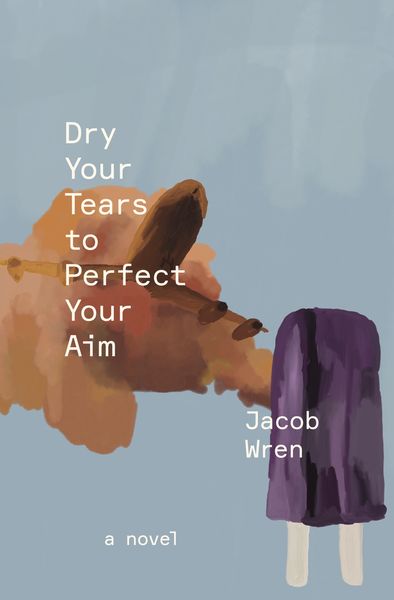Jacob Wren Stumbles Into a Strange Utopia Amidst a Raging War Zone in Dry Your Tears to Perfect Your Aim
It's a difficult task to distill the political struggles of our time into fiction, and authors run the risk of either alienating readers by doing so, or by creating a story that is simply too close to home for them to stomach at the time.
Nonetheless, when fiction does tackle such subjects and captures them in a unique and interesting way, with a story-first approach, we are left with novels that not only speak to our time but also make it that little bit more palatable and understandable.
We have just this kind of work in Dry Your Tears to Perfect Your Aim (Book*hug Press), the new novel from Jacob Wren. In this mix of real-world politics and literary invention, the reader follows a depressed writer who becomes obsessed with the idea of travelling to a war zone to see what his tax dollars are funding there. When he does arrive in the heart of the conflict, he stumbles upon a strange strip of land that supports a utopian, grassroots, feminist community thriving amidst all of the war and chaos.
It's in this place that the protagonist begins to question his sense of self and the ethics of his writing, and where he realizes that the women in his life articulate truths that he could not see until that significant and unlikely moment.
We have a fascinating Long Story Novelist interview with the author to share with you today on Open Book, so read on and plunge deeper into Dry Your Tears to Perfect Your Aim.
Open Book:
Do you remember how you first started this novel or the very first bit of writing you did for it?
Jacob Wren:
Perhaps the first inkling for Dry Your Tears to Perfect Your Aim came many years ago when I turned on the television and saw images of the so-called Shock and Awe campaign in Iraq. My first impulse was: I want to go there, to feel it for myself. Not watch televised images of people being killed by U.S. missiles but rather put myself in the missiles path and possibly be killed myself. I knew it would accomplish nothing, would solve nothing, but nonetheless I had such an intense impulse that I wanted to go.
It was fourteen years later that I actually began writing the book. For that entire time the original impulse must have continued rolling along somewhere at the back of my mind, other ideas quietly accruing alongside it. (At the time, I was curious exactly how long it took me to write each of my books, so I wrote down the day I started: April 9, 2017. And the date I finished the first draft: March 28, 2019. I somehow find it interesting it both started and ended in the spring.)
Your CanLit News
Subscribe to Open Book’s newsletter to get local book events, literary content, writing tips, and more in your inbox
I have a fairly distinct memory of how it felt to write the first few pages. This feeling of a person starting out on a journey while at the same time knowing that the journey is a very bad idea. It’s a feeling I’ve had often in my life: knowing something is a bad idea but somehow compelled to go through with it anyway. Perhaps not in spite of the fact that it’s a bad idea, but because of that fact. If people didn’t do things that were questionable maybe there wouldn’t be any adventures. But probably there still would. As I get older, I increasingly try to put bad ideas aside and pursue more promising plans. Except in writing. I still feel that in writing a really bad idea, if you effectively pull it off, can sometimes result in something rather spectacular. But only if you effectively pull it off, so writer beware.
OB:
If you had to describe your book in one sentence, what would you say?
JW:
It seems I’m not able to describe my book in one sentence. So this is three short sentences (since rules are meant to be broken): A depressed writer becomes obsessed with the fact that his tax dollars are being used to fund foreign wars and spontaneously buys a plane ticket to go walk through the war and see for himself. While there, he stumbles upon a utopian city-state and lives with them for a year. It then becomes a novel about a utopia surrounded by war, and about whether or not he has any right to write about them and, if so, how he should do so.
OB:
Did you do any specific research for this novel? Tell us a bit about that process.
JW:
I did so much research for this novel. More than I’d ever done before. I read endless books about war, about revolutionary movements, and about utopias. I wasn’t looking for anything specific, only trying to soak up as much information as I possibly could. Once I started reading these things it was as if I couldn’t stop. It is too much information to even begin to summarize here, so maybe I’ll focus on one specific book that really disturbed me in ways that shifted my thinking: A History of Bombing by Sven Lindqvist. Utilizing a counterintuitive “Choose Your Own Adventure” structure to outline the ethical implications of aerial bombing and total war, this book provided me with so much bleak information and analysis that I hadn’t seen elsewhere. The historical decisions regarding who to bomb and who not to bomb were so vicious, colonial and racist. And the ways aerial bombing generated an overwhelming sense of terror in the civilian population was a method of control unlike any other that had come before. Some of these things I already instinctively understood, but Lindqvist displays his research in ways that can’t be denied. In another of his books he writes: “You already know enough. So do I. It is not knowledge we lack. What is missing is the courage to understand what we know and to draw conclusions.”
OB:
Did you include an epigraph in your book? If so, how did you choose it and how does it relate to the narrative?
JW:
My book actually has two epigraphs:
“Maybe what’s needed is to write with the awareness of being wrong. Can one’s wrongness be a source of compassion.”
—Kate Zambreno, Appendix Project
“Not to make yourself stupid from the power of others and not from your own powerlessness.”
—Alexander Kluge
They relate to the book in such a literal way that it almost feels misguided to further explain it. There were many other possible epigraphs over the course of writing the book but, in the end, I suppose I went with the ones that were most on the nose. Which is perhaps not what I would have done with a different kind of book. Dry Your Tears to Perfect Your Aim tries to face certain unbearable realities head on, and in doing so opens itself up to possible wrongness and stupidity. While, at the same time, working hard to swerve away from such possibilities.
OB:
What if, anything, did you learn from writing this novel?
JW:
I certainly learned something but feel uncertain how to best express it. Dry Your Tears to Perfect Your Aim is an anti-war novel, but also a book about the ethics of writing and how it does and doesn’t intersect with attempts to live a more ethical life. As I was writing it, I was constantly questioning my own politics and the politics implicit in everything I wrote. In some ways, I came to the conclusion that if you were to write a politically perfect book it might not be a very enjoyable book to read. I often write from my subconscious, and it’s unclear to me whether my subconscious has the politics I want it to. Like everyone else, I grew up in a racist, sexist, homophobic, classist, etc. society and therefore I must still have all of these things inside of me. (I also have a desire to be anti-racist, feminist, queer positive, etc.) So I believe that I have a responsibility to interrogate myself as I work, and try to write and publish in ways that don’t do unnecessary harm. I’m still not certain I’m getting to the heart of the matter, but somewhere in all of this reflection and self-questioning we might be getting at some of the things I learned. I believe I’ve written a book that is both compelling and enjoyable to read, while at the same time asking many difficult questions. But, of course, on such matters you’ll have to decide for yourself.
________________________________________________
Jacob Wren makes literature, performances, and exhibitions. His books include Revenge Fantasies of the Politically Dispossessed; Polyamorous Love Song (finalist for the Fence Modern Prize in Prose and a Globe and Mail Best Book of 2014); Rich and Poor (finalist for the Paragraphe Hugh MacLennan Prize for Fiction and a Globe and Mail best book of 2016); and Authenticity is a Feeling. He is artistic co-director of the Montreal-based interdisciplinary group PME-ART. Wren lives in Montreal.







